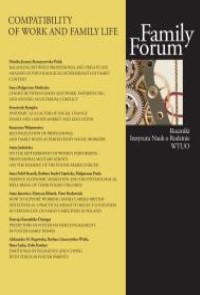Emotional intelligence and coping with stress in foster parents
Emotional intelligence and coping with stress in foster parents
Author(s): Aleksandra Maria Rogowska, Barbara Zmaczyńska-Witek, Ilona Łatka, Zofia KardaszSubject(s): Neuropsychology, Psychology of Self, Behaviorism, Family and social welfare
Published by: Uniwersytet Opolski
Keywords: emotional intelligence; coping styles; foster care; parents; mediation analysis;
Summary/Abstract: Although much research on emotional intelligence (EI) and coping with stress has been performed in recent years, little is known about these dimensions of individual differences between parents. The main purpose of this study was to examine emotional intelligence and coping styles in foster parents. The study included 124 individual participants aged between 30 and 64 years old (M = 45.18, SD = 8.72), including foster parents (n = 63, 50.81%) and biological parents (n = 61, 49.19%). The cross-sectional survey study was conducted using the Schutte Self-Report Emotional Intelligence Test (SSEIT) and Coping Inventory for Stressful Situations (CISS). In comparison to biological parents, foster parents demonstrated significantly higher levels of emotional intelligence (EI), more frequently used task-oriented coping styles, and less often pursued emotional and avoidant coping strategies to deal with stress. EI was positively correlated with task-oriented coping and negatively with emotional coping. Hierarchical regression analysis indicated that EI was a strong predictor of task-oriented coping. Training focused on the enhancement of both EI and coping with stress should be considered as an effective way to improve parents’ competence.
Journal: Family Forum
- Issue Year: 2021
- Issue No: 11
- Page Range: 165-190
- Page Count: 26
- Language: English

